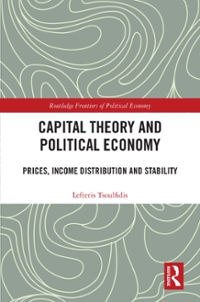Question
Game theory is a useful analytic tool to study strategic interactions,e.g. seehttps://theconversation.com/john-nash-and-his-contribution-to-game-theory-and-economics-42355 This game theory presentation (GTP) relates to the issue of restrictions countries are
Game theory is a useful analytic tool to study strategic interactions,e.g. seehttps://theconversation.com/john-nash-and-his-contribution-to-game-theory-and-economics-42355
This game theory presentation (GTP) relates to the issue of restrictions countries are making to reduce emissions and to slow global warming and other impacts on the environment.
The Paris Agreement is alegally binding international treaty on climate change. It was adopted by 196 Parties in Paris, on 12 December 2015 and entered into force on 4 November 2016.
Itsgoal is tolimit global warmingto well below 2,preferably to 1.5 degrees Celsius, compared to pre-industrial levels.
To achieve this long-term temperature goal, countries aim toreach global peaking of greenhouse gas emissions as soon as possibleto achieve a climate neutral world by mid-century.
The Paris Agreement isa landmarkin the multilateral climate change process because, for the first time, a binding agreementbrings all nations into a common cause to undertakeambitious efforts to combat climate change and adapt to its effects.
The world's twocarbon superpowers the US and China - together account for some 40% of global greenhouse-gas emissions. For any agreement on climate change to be successful both countries would need to restrict their emissions sufficiently. If one of these countries appears to be NOT cooperating and not honouring their agreement a blame game could result and a standoff that would have seriously set back global efforts.
Read the following articles on the Paris agreement and US CHINA deals.
https://www.bbc.com/news/science-environment-59238869
https://www.forbes.com/sites/arielcohen/2019/11/07/us-withdraws-from-paris-accord-ceding-leadership-to-china/?sh=7bf97d573c1c
https://www.brookings.edu/blog/planetpolicy/2021/10/28/rebuilding-us-chinese-cooperation-on-climate-change-the-science-and-technology-opportunity/
Part (A) 25 marks
- Explain what the Paris Agreement is. When was it established, what are its aims how many countries have participated? Use referencing and examples to support your points. (5 marks)
- Has the Paris Agreement been a success? Discuss (3 marks)
- Explain why it is important that BOTH China and the US cooperate with the Paris Agreement and each other. (2 marks)
- Differentiate between "self regarding" and "other regarding" preferences? Use the US and China as examples here. (2 marks)
- Complete the table below (2 marks)
TABLE 1
| CHINA | |||
| Participate | Not Participate | ||
| US | Participate | If both countries participate they get the full benefits from both their own and the other's contributions but it will cost them to do so. | _____________Participates, ____________does not participate. _____________ gets a smaller payoff. ___________ gets the full benefits from only looking after their own nation's people and free rides on __________participation. |
| Not Participate | ______________ Participates, _______________ does not participate. _____________ gets a smaller payoff. ___________ gets the full benefits from only looking after their own nation's people and free rides on __________participation. | If both countries do not participate they save on the cost of participating but get all the negative effects of both superpowers continuing to emit harmful gases unchecked. |
- Given this is a simultaneously played game, explain what CHINA'S best strategy is (given the US' possible actions) and what the US' best strategy is. (4 marks)
- Does a DOMINANT STRATEGY exist for both countries? Explain.
(3 marks)
- Explain if a NASH EQUILIBRIUM/RIA results and whether it is the OPTIMAL OUTCOME.
(2 marks)
- Is this outcome Pareto efficient? Explain (2 mark)
TABLE 2
SELF REGARDING PREFERENCES
| CHINA | |||
| Participate | Not Participate | ||
| US | Participate | 10 \ 10 | 5 \ 6 |
| Not Participate | 6 \ 5 | 8 \ 8 |
Part (b) 5 marks
- Explain what is meant by EQUITY (fairness) equity) AND EFFICIENCY? Is cooperation between both countries likely to be aiming to achieve these? Discuss. (2 marks)
- Describe ways to give incentives to both countries to achieve the optimal outcome? (3 marks)
Step by Step Solution
There are 3 Steps involved in it
Step: 1

Get Instant Access to Expert-Tailored Solutions
See step-by-step solutions with expert insights and AI powered tools for academic success
Step: 2

Step: 3

Ace Your Homework with AI
Get the answers you need in no time with our AI-driven, step-by-step assistance
Get Started


